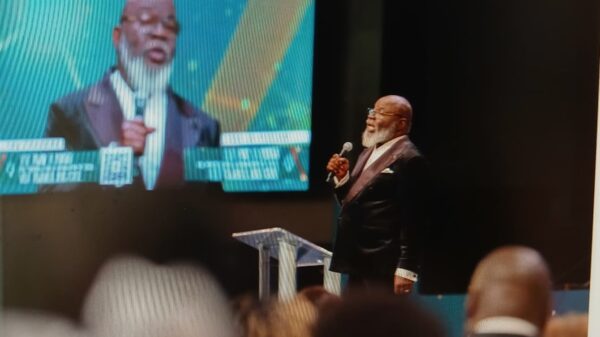
Manuel Ben Zvi hit pause on the regularly scheduled programming of his government class. Lessons on the Texas executive branch would have to wait.
On Friday afternoon, he told his students, they had something more pressing to discuss first. What was it?
“The first African-American woman was voted onto the Supreme Court,” Admiral Jackson, 16, offered.
“Appointed,” Ben Zvi gently corrected. And on Thursday, she was confirmed by the Senate.
A day after Judge Ketanji Brown Jackson made history, students at Dallas ISD’s Judge Barefoot Sanders Law Magnet delved into what it meant for them.
The teacher asked his students to make a list: What historic moments have you already lived through?
Admiral leaned over his desk and quickly began writing. First Black president. First Black vice president. And now, the first Black woman who will be a Supreme Court justice.
Jackson was confirmed by the Senate, 53-47, with votes mostly falling along party lines. She will likely take the bench later this summer, once Justice Stephen Breyer steps down.
Her confirmation inspired Dallas’ bench of Black female judges and provided a sense of hope to women across the city. For many teenagers, it was yet another sign of the heights they could reach.
Ben Zvi said it was important for his students to stop and reflect on this historic moment. They’ve lived through so much major news in their 18 years, but this was different. Most of the law magnet students are girls and almost all are Black or Hispanic.
The teacher asked his students to write to Jackson, incorporating government class terms like “bipartisan” and “confirmation” into their letter marking her achievement.

Anavell Rodriguez immediately opened Google Docs to begin drafting her note, which she decided to share aloud with the class.
“It is no secret that it is hard to accomplish things as a minority and as a woman,” Rodriguez read. “I am truly grateful for women like yourself as it opens so many doors for not only me but the generations of girls behind me.”
The name of Rodriguez’s school anchors her and other students in history, linking back to the Supreme Court’s landmark 1954 ruling that it is unconstitutional to have separate schools for Black and white children.
The Brown v. Board of Education decision — argued by Thurgood Marshall, who would go on to be the first African-American justice on the Supreme Court — fueled a lawsuit in Dallas, whose leaders resisted the nation’s highest court and continued promoting de facto school segregation.
The remediation plan that resulted from that lawsuit called for the creation of several magnet programs, which went on to encompass the Townview Magnet Center. DISD, meanwhile, remained under federal oversight until Judge Sanders declared it officially desegregated less than two decades ago.
Today, the city’s law magnet churns out award-winning debate teams, like the one that shaped a teenage Jackson.
Jackson has pointed to her education at a Miami public high school as something that indelibly shaped her. Her experience on the debate team, she said in a 2017 lecture, was what best prepared her for success in law and in life.
“I learned how to reason and how to write, and I gained the self confidence that can sometimes be quite difficult for women and minorities to develop at an early age,” she said.
“I have no doubt that, of all of the various things that I’ve done, it was my high school experience as a competitive speaker, that taught me how to lean in, despite the obstacles, to stand firm in the face of challenges, to work hard, to be resilient, to strive for excellence, and to believe that anything is possible.”
As the students traced Jackson’s confirmation process during class, the teenagers imagined that, not too long from now, it might not be a huge news story when a powerful position goes to a person of color.
Admiral, who is Black, thought about his three-year-old niece. He’s glad she won’t grow up in a country where this type of historic appointment hasn’t happened before.
“There’s a term,” Ben Zvi told his class, “called ‘breaking the glass ceiling.’”
The DMN Education Lab deepens the coverage and conversation about urgent education issues critical to the future of North Texas.
The DMN Education Lab is a community-funded journalism initiative, with support from The Beck Group, Bobby and Lottye Lyle, Communities Foundation of Texas, The Dallas Foundation, Dallas Regional Chamber, Deedie Rose, Garrett and Cecilia Boone, The Meadows Foundation, Solutions Journalism Network, Southern Methodist University and Todd A. Williams Family Foundation. The Dallas Morning News retains full editorial control of the Education Lab’s journalism.









You must be logged in to post a comment Login